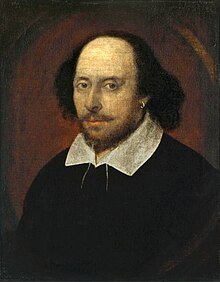Shakespeare's
| William Shakespeare | |
|---|---|

The Chandos portrait, artist and authenticity unconfirmed. Courtesy of the National Portrait Gallery, London.
|
|
| Born | Stratford-upon-Avon, Warwickshire, England |
| Baptised | 26 April 1564 |
| Died | 23 April 1616 (aged 52) Stratford-upon-Avon, Warwickshire, England |
| Resting place | Church of the Holy Trinity, Stratford-upon-Avon |
| Occupation | Playwright, poet, actor |
| Era | Elizabethan era |
| Movement | English Renaissance |
| Spouse(s) | Anne Hathaway (m. 1582–1616) |
| Children | |
| Signature | |
William Shakespeare (/ˈʃeɪkspɪər/; 26 April 1564 (baptised) – 23 April 1616) was an English poet, playwright, and actor, widely regarded as the greatest writer in the English language and the world's pre-eminent dramatist. He is often called England's national poet, and the "Bard of Avon". His extant works, including collaborations, consist of approximately 38 plays,154 sonnets, two long narrative poems, and a few other verses, some of uncertain authorship. His plays have been translated into every major living language and are performed more often than those of any other playwright.
Shakespeare was born and brought up in Stratford-upon-Avon, Warwickshire. At the age of 18, he married Anne Hathaway, with whom he had three children: Susanna, and twins Hamnet and Judith. Sometime between 1585 and 1592, he began a successful career in London as an actor, writer, and part-owner of a playing company called the Lord Chamberlain's Men, later known as the King's Men. He appears to have retired to Stratford around 1613, at age 49, where he died three years later. Few records of Shakespeare's private life survive, which has stimulated considerable speculation about such matters as his physical appearance, sexuality, religious beliefs, and whether the works attributed to him were written by others.
...
Wikipedia
